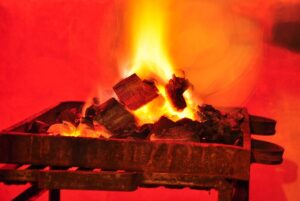Picture this: a raging inferno tearing through a forest, flames reaching high into the sky, scorching everything in their path. It’s a scene that evokes fear and panic in most people, but for some, that fear is more than just a natural response. It’s pyrophobia – a persistent and irrational fear of fire.
But what if we told you that this fear might actually be a good thing? That pyrophobia could be a vestigial trait from our evolutionary past, designed to keep us safe from the very real dangers of fire in the natural world?
In this article, we’ll explore the origins and benefits of pyrophobia, as well as the psychological impact of traumatic fire experiences. We’ll also discuss how this fear can keep you safe in modern times and offer strategies for overcoming it.
So buckle up, and let’s dive into the world of pyrophobia!
The Evolutionary Basis of Pyrophobia
 Understanding the evolutionary reasons behind our fear of flames can leave us in awe of the power of nature’s selective pressures. Pyrophobia, or a fear of fire, is an instinctual response that has evolved over millions of years.
Understanding the evolutionary reasons behind our fear of flames can leave us in awe of the power of nature’s selective pressures. Pyrophobia, or a fear of fire, is an instinctual response that has evolved over millions of years.
Early humans who were afraid of fire were more likely to survive and pass on their genes, which is why we still experience this fear today. One of the evolutionary advantages of pyrophobia is that it helps protect us from harm. Fire is dangerous and can cause serious injury or even death. By being afraid of fire, we are more likely to avoid situations where we could be hurt.
This fear also helps us to be more cautious when handling fire, which reduces the risk of accidents. Cultural influences can also play a role in our fear of fire. For example, many cultures around the world have stories about the dangers of fire, which serve as a warning to future generations.
These stories help to reinforce our natural tendency to be afraid of fire, making us more likely to avoid it. Overall, our fear of fire may seem irrational at times, but it’s actually a useful tool that has helped us survive and thrive as a species.
The Dangers of Fire in the Natural World
As flames consume the dry brush and scorched earth becomes the norm, it’s clear that fire is a force to be reckoned with in the natural world.
Fire ecology is the study of how fire interacts with the environment, and it shows that without the danger of fire, many ecosystems wouldn’t exist as we know them today.
In fact, some plants and animals have adapted specifically to survive and thrive in fire-prone environments.
While the dangers of wildfires can’t be ignored, there are also benefits to controlled burning.
In many ecosystems, fire actually helps to maintain biodiversity by opening up space for new growth and removing dead plant material that could otherwise fuel larger, more destructive fires.
Additionally, certain plants require fire to germinate and grow, and some animals rely on the new growth that follows a fire for food and habitat.
While it’s understandable to fear fire, it’s important to recognize that it also plays a crucial role in many ecosystems.
By understanding fire ecology and the benefits of controlled burning, we can work to manage the risks of wildfires while also supporting healthy, thriving natural environments.
The Psychological Impact of Traumatic Fire Experiences
Experiencing traumatic fire events can have a lasting impact on individuals, influencing their mental health and overall well-being. Coping mechanisms are essential for those who have gone through such experiences.
Some may turn to therapy or support groups to help them process their emotions and trauma. Others may find solace in creative outlets such as art or writing. It’s important to find healthy ways to cope with the aftermath of a traumatic fire event.
The long term effects of traumatic fire experiences can vary from person to person. Some may develop pyrophobia, a fear of fire, as a result of their trauma. While this may seem like a hindrance, it can actually be a protective mechanism. Pyrophobia can keep individuals from engaging in risky behaviors that could lead to further harm.
It’s important to recognize that everyone copes with trauma differently and there’s no right or wrong way to do so. It’s crucial for individuals who have experienced traumatic fire events to seek support and care. Ignoring the long term effects of trauma can lead to further mental health issues and difficulties in daily life.
It’s important to remember that healing is a process and it takes time. With the right support and coping mechanisms, individuals can learn to manage their trauma and move forward in a healthy way.
How Pyrophobia Can Keep You Safe in Modern Times
Feeling a rush of adrenaline and heart pounding, your body instinctively pulls back as the bright orange flames lick the wooden logs of the fireplace, reminding you of the destructive power of nature and the importance of caution in the face of danger. Pyrophobia, or the fear of fire, may seem like an irrational fear in modern times with advanced technology and safety measures, but this fear can actually keep you safe.
Being cautious around fire can prevent accidents and injuries, which is especially important in highly populated areas where fire can easily spread. Modern safety measures such as smoke detectors, fire extinguishers, and sprinkler systems are incredibly effective in preventing fires from getting out of control. However, there are still instances where caution around fire is necessary.
In addition, pyrophobia can also encourage individuals to be more mindful of the environment and the benefits of controlled burns. Controlled burns are a natural way to reduce the risk of wildfires and promote healthy ecosystems. By being cautious around fire, individuals can appreciate the role that fire plays in the natural world and the benefits of using it in a controlled manner.
In conclusion, pyrophobia may seem like an irrational fear in modern times, but it can actually keep you safe. Being cautious around fire can prevent accidents and injuries, especially in densely populated areas. Additionally, pyrophobia can encourage individuals to be more mindful of the environment and the benefits of controlled burns. By respecting the power of fire and using it in a controlled manner, we can promote healthy ecosystems and prevent devastating wildfires.
Overcoming Pyrophobia: Treatment and Coping Strategies
If you’re struggling with a fear of flames, there are ways to conquer it and feel more comfortable around this element.
One of the most effective treatments for pyrophobia is exposure therapy. Exposure therapy is a technique where you gradually expose yourself to your fear in a controlled environment until you become desensitized to it. This therapy can be done with the help of a therapist or on your own with the use of virtual reality technology.
Another way to overcome pyrophobia is by practicing relaxation techniques. When you feel anxious or stressed, your body goes into a fight or flight response, which can make your fear of fire even worse. By practicing relaxation techniques such as deep breathing, meditation, or yoga, you can learn how to calm your body and mind, making it easier to cope with your fear. It is important to note that these techniques may take time to master, so be patient and consistent in your efforts.
In summary, if you are struggling with pyrophobia, there are effective ways to overcome it. Exposure therapy and relaxation techniques can help you conquer your fear and feel more comfortable around fire. Remember to be patient with yourself and seek the help of a therapist if needed. With time and effort, you can overcome your pyrophobia and live a more fulfilling life.
Is pyrophobia a common fear among humans?
Did you know that pyrophobia, or the fear of fire, is one of the most common phobias among humans? According to prevalence statistics, it affects about 10% of the population.
Coping mechanisms for pyrophobia can range from avoidance of any situation involving fire to seeking therapy to overcome the fear. While it may seem irrational to fear something that is a necessary part of daily life, the fear of fire may actually have evolutionary roots in keeping us safe from harm.
Despite this, pyrophobia can still cause significant distress and interfere with daily activities.
What are some common triggers for pyrophobia?
If you have pyrophobia, certain triggers can cause intense fear and anxiety. Fire-related traumatic experiences, such as being trapped in a burning building or witnessing a devastating wildfire, can be common triggers for this phobia.
However, there are treatment options available for pyrophobia, including cognitive-behavioral therapy and exposure therapy. These therapies can help you confront and overcome your fear of fire, allowing you to live a more fulfilling life without the constant worry of potential fire hazards.
Can pyrophobia be genetic?
Inherited phobias, such as pyrophobia, can be passed down through genetics. This may be due to the evolution of our ancestors who learned to fear fire as a means of survival.
While some may view pyrophobia as an irrational fear, it can actually be a beneficial trait in certain situations. For example, an individual with pyrophobia may be more cautious around fire, reducing their risk of accidental injury or death.
However, for those who struggle with severe pyrophobia, seeking professional help can improve their quality of life and reduce the negative impact of their fear.
Are there any physical symptoms of pyrophobia?
When faced with fire, your body may react with the classic ‘fight or flight’ response. You may feel your heart racing, your palms sweating, and your breathing quickening. These physical symptoms of fear are common in many phobias, including pyrophobia.
While pyrophobia may be a hindrance in situations where fire is necessary, such as lighting a stove or starting a campfire, it can also be a protective instinct. However, if pyrophobia is interfering with your daily life, there are treatments available such as cognitive-behavioral therapy or exposure therapy to help you overcome your fear.
How can pyrophobia affect a person’s daily life and relationships?
If you suffer from pyrophobia, the fear of fire, it can have a profound impact on your daily life and relationships. You may avoid activities that involve fire, such as cooking or lighting candles, and even avoid social gatherings where fire is present.
Coping mechanisms, such as deep breathing and relaxation techniques, may help alleviate some of the fear and anxiety associated with pyrophobia. Additionally, therapy options such as cognitive-behavioral therapy and exposure therapy can help you confront and overcome your fear in a safe and controlled environment.
While pyrophobia may seem like an irrational fear, it’s important to remember that it’s a valid concern and seeking support can help improve your quality of life.
So, now you understand why pyrophobia, or the fear of fire, might actually be beneficial in keeping you safe. It’s a natural response that has evolved over millions of years to protect us from the dangers of fire in the natural world.
Even in modern times, the fear of fire can prevent us from taking unnecessary risks and keep us alert to potential hazards.
But what if you suffer from pyrophobia and it’s interfering with your daily life? Don’t despair, there are effective treatments and coping strategies available.
Whether it’s hypnosis, exposure therapy, cognitive-behavioral therapy, or medication, there’s help out there to overcome your fear and live a more fulfilling life.
Remember, it’s always better to face your fears than to let them control you. So take that first step and seek help today.





